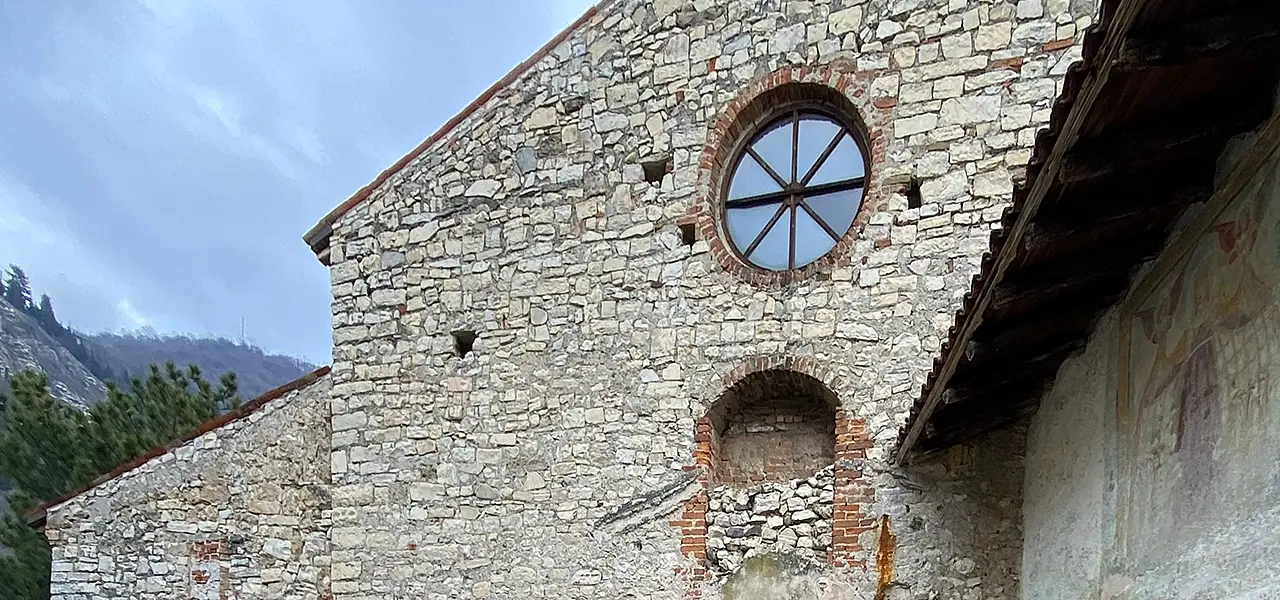




















The scenic monastery of St. Peter in Lamosa
An ancient monastery, a treasure trove of frescoes, and unparalleled views of the Sebino peat bogs



Where

What is it and where is the Monastery of St. Peter in Lamosa
The Monastery of St. Peter in Lamosa is a complex of religious buildings such as the church, cloister, and the Hall of the Disciples, and functional ones such as the granary, storehouse, and dovecote. Adding to the beauty of the monastic structures is the magnificent view from here. In fact, the monastery is located high above the peat bogs, overlooking the marshy area known as "Lame" (hence the name San Pietro in Lamosa). The oldest building is the church made of irregular stones and remodeled several times. The rustic appearance of the exterior hides the Belgian frescoes inside.
Inside the church: the passing of the ages told by the frescoes
The frescoes in the church are very interesting. With their style they testify to the evolution of the building itself, ranging from Romanesque to Renaissance. The earliest, dating from the 1200s, is the red ochre scroll with a lion's head, so monstrous that it perhaps impersonates the Evil One. To the late 1400s date the votive frescoes of Madonnas and saints, to the 1500s those depicting a celestial vault divided into eight segments in which evangelists and doctors of the church alternate.
A wonder not to be missed: the Sala dei Disciplini
Beyond the small cloister, you reach the most fascinating part of the complex: the Sala dei Disciplini. A word of advice: sometimes this hall is not offered during the visit, but you ask if it is possible to see it, they will open it for you. You will find yourself in the headquarters of the Confraternity of the Disciplines of Provaglio, frescoed in the 1500s. Who knows why, only one wall is in color, the others are all in black and white. The hypothesis that it is an unfinished work would have to be discarded given the wealth of details and details in the scenes. What is certain is that it is an unusual and wonderful sight.
A bit of history
It was two brothers of Lombard origin, Ambrose and Oprando, who donated the little church to the monks of Cluny in 1083 as a suffrage for their souls. A few years later the monastery was built and the church, which in the meantime had become a parish church, was enlarged. Having fallen into serious decay in the 1960s and 1970s, it was restored after being acquired by the municipality in 2000. Ecclesiastically owned remains the church.
Fun fact: Who were the Disciplini, or Disciplinati, after whom the monastery hall is named?
The Disciplinati were also very powerful lay people, united in a confraternity, who lived a life of prayer and penance. To imitate Christ's sufferings during the Passion, they practiced self-flagellation, which is why they were also called flagellants or beaten. At first they were considered heretics, then in 1336 their rule was approved. They practiced many works of charity: they cared for churches and oratories, ministered to the sick and took care of the burial of the dead. Frescos of the Dance Macabre are often found in their oratories, as in Iseo and Clusone.
Enter the Map of Italy's Undiscovered Wonders and find treasures where you least expect it... Inspire, Recommend, Share...
Contacts
The Map thanks:
In the Community
Enter the Map of Italy's Undiscovered Wonders and find treasures where you least expect it... Inspire, Recommend, Share...
Where

Contacts

